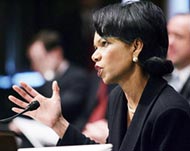Abbas wins support for reform
Palestinian leader Mahmud Abbas won global support for reforms to his administration at a key meeting in London.

In return, he promised on Tuesday to “put our house in order” and renew peace talks with Israel.
Foreign ministers and top officials from 23 nations and six international institutions – including UN Secretary-General Kofi Annan and US Secretary of State Condoleezza Rice – joined the day-long meeting, seen as a stepping stone to a genuine Israeli-Palestinian peace conference.
Israel did not attend the gathering.
The final version of the meeting’s conclusions applauded the Palestinian Authority’s blueprint for reforms, calling it “a major step in implementing its roadmap commitments”.
But the statement then went on to add: “At the same time, participants urged and expect action by Israel in relation to its own roadmap commitments”.
United purpose
All the participants at what was officially called the London meeting were “here with one united purpose”, British Prime Minister Tony Blair said earlier in the day as he opened the event at a conference centre in central London.
“And that is to try and bring about the vision of the two-state solution for the Middle East … an Israel confident of its security and a viable and independent Palestinian state,” he said.
 |
|
The London meeting condemned |
Abbas, the newly elected president of the Palestinian Authority after last year’s death of Yasir Arafat, promised to press ahead with sweeping administrative, economic and security reforms.
Fulfilling such changes are vital if the so-called roadmap to a Middle East peace – which aims for an independent Palestine alongside a secure Israel – can be put back on track.
“We are going forward to put our house in order and to address our commitments,” Abbas said, adding, “We only have one demand, which is a reciprocity according to the main elements of the roadmap.”
Reform aid
Abbas said he hoped Tuesday’s meeting would lead to “the beginning of an international conference that would take place in accordance with the roadmap”.
French Foreign Minister Michel Barnier said his nation was willing to host such a peace conference in the second half of this year.
 |
|
Condoleezza Rice asked Sharon |
It was also agreed on Tuesday that the European Union, the World Bank and the United States would take the lead in coordinating efforts to help the Palestinians reform their public administration, economy and security forces respectively.
Rice, pointing to Israel’s planned withdrawal from Gaza and parts of the West Bank, said Prime Minister Ariel Sharon’s government must help, not hinder, the quest for peace.
“Israel must also take no actions that prejudice a final settlement and must help ensure that a new Palestinian state is truly viable,” she said.
“A state of scattered territories will not work and peace must be nurtured by many hands if it is to flourish.”
Gaza withdrawal
That sentiment was echoed in a statement by the Quartet, the diplomatic foursome of the European Union, Russia, United States and United Nations that is the driving force behind the roadmap.
“Withdrawal from Gaza should be full and complete and should be undertaken in a manner consistent with the roadmap,” the Quartet said in a statement after meeting on the sidelines of Tuesday’s meeting.
“A state of scattered territories will not work,” it added.
Rice, at the cutting edge of renewed US interest in the Middle East, also called upon Arab states to take concrete steps to crack down on groups which target Israel, and to end their diplomatic isolation of the Jewish state.
Bombing condemned
Tuesday’s draft communique stressed the need for the Palestinians to shore up their political institutions, breathe new life into their shattered economy, and properly organise their security forces to deal with extremist groups.
The meeting also saw condemnation of the human-bomb attack in Tel Aviv last Friday that killed five people, shattering a ceasefire that Israel and the Palestinians agreed upon in early February.
“This again demonstrates that extremist forces still insist on destroying any efforts at a peace process,” Abbas said.